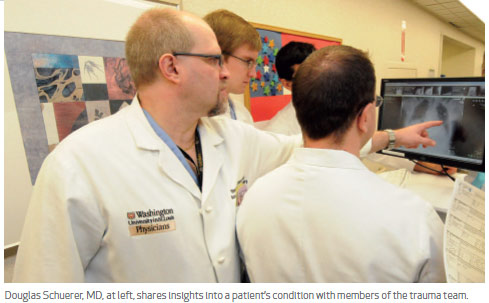
Q. HOW DOES AN EMERGENCY DEPARTMENT DIFFER FROM A TRAUMA CENTER?
A trauma center comprises various specialties and areas of the entire hospital system that are set up to care for injured patients. An emergency department is a key element of the trauma center and the point where most trauma patients enter the system.
Emergency departments see everything from scratches to pneumonia to heart attacks. A trauma center has to be ready for much more, including people with major head injuries, people who are intubated and people who need to go straight to the operating room. Only trauma centers have a designated effort to care for acutely injured patients.
Q. HOW ARE TRAUMA CENTERS CLASSIFIED AND CREDENTIALED?
Trauma centers are designated at the state and/or national level. Barnes-Jewish Hospital’s Trauma Center is designated by Missouri and Illinois, and verified by the American College of Surgeons. Designations are expressed as Level 1 through Level 4, with Level 1 being the highest. With its national Level 1 verification, Barnes-Jewish Hospital is one of only three adult trauma centers in Missouri operating at the top level.
Q. HOW DO THE RESOURCES OF A TRAUMA CENTER DIFFER FROM THOSE REQUIRED OF AN EMERGENCY DEPARTMENT THAT IS NOT PART OF A TRAUMA CENTER?
A Level 1 trauma center must:
> Employ a designated physician trauma director and a nurse trauma program manager
> Provide outreach and injury-prevention programs
> Employ data analysts to ensure accurate data capture
> Use a thorough performance-improvement process
The facility must include:
> Inhouse computed tomography and magnetic resonance imaging
> Interventional radiology
> Operating rooms always available for general surgery, orthopedic surgery, brain surgery, spine surgery, vascular surgery and cardiothoracic surgery
> An intensive care unit
> Trauma resuscitation rooms
> The capability to perform emergency thoracotomies
> A blood bank capable of providing massive blood resuscitation
In contrast, emergency departments that are not part of a trauma center need only be prepared to treat general medical problems, such as minor lacerations, headaches, chest pain and abdominal pain.
Q. WHAT KIND OF STAFFING DOES A TRAUMA CENTER OFFER?
Staffing requirements include the following professionals:
> Trauma surgeons, who specialize in the care of traumatically injured patients, are the main requirement for a trauma center. The trauma attending surgeon must be at the patient’s bedside within 15 minutes. At Barnes-Jewish Hospital, trauma attending physicians are inhouse 24 hours a day, seven days a week.
> A trauma center also must have emergency-department physicians and specialists in surgical intensive care, orthopedic surgery and neurosurgery, among other specialties, available at all times. In an emergency department, such personnel may not be available.
> Radiologists, otolaryngologists, cardiologists, cardiac surgeons, pulmonologists, nephrologists and many other specialists must be on call at a trauma center. In an emergency department, such expertise often is unavailable.
> At a trauma center, nurses have additional specialized trauma training. Nurse coordinators assure that protocols are adhered to and that patients’ families understand acute trauma care. In emergency departments, such expertise and training is often lacking.
> Injury-prevention coordinators and performance-improvement specialists are among the support staff at trauma centers but often are not available in emergency departments.
Q. WHAT ARE THE REQUIREMENTS FOR CONTINUING EDUCATION FOR TRAUMA CENTER PERSONNEL?
Physicians and nurses who take care of patients at trauma centers must earn an additional eight to 16 hours of continuing education annually in trauma-related topics.
Q. WHAT ELSE SETS A TRAUMA CENTER APART FROM AN EMERGENCY DEPARTMENT?
Trauma centers perform research to improve trauma care. Some of the Washington University studies in the trauma center at Barnes-Jewish include:
> Prevention of brain injury in trauma
> Bleeding cessation in trauma patients
> Techniques to improve the healing of fractures
> Better recognition of bowel injuries using CT scans